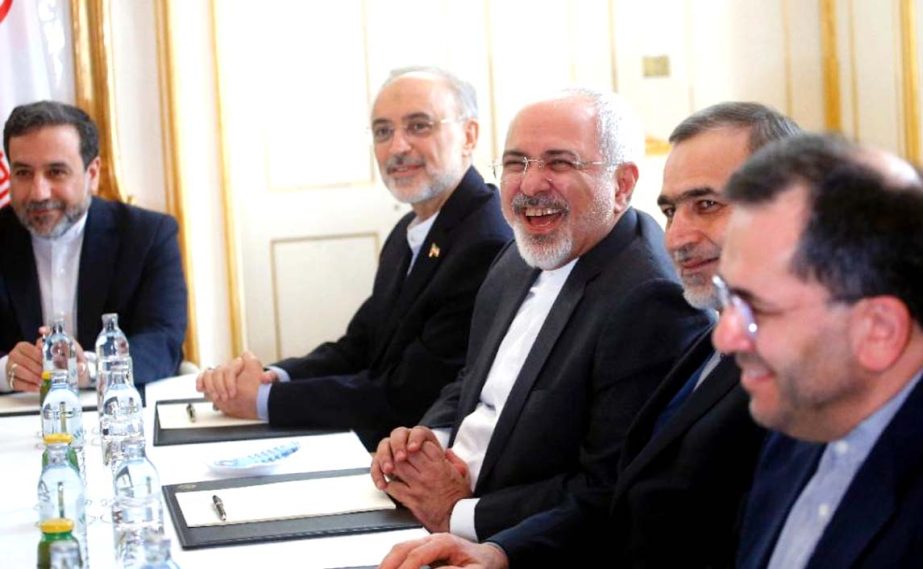
AFP, Vienna :
High-stakes nuclear talks went into extra time Wednesday after Iran and world powers missed yet another midnight deadline to strike a ground-breaking deal to curb Tehran’s nuclear programme.
Top diplomats have now given themselves until July 7 to reach the deal aimed at putting a nuclear bomb out of Iran’s reach which has been under negotiation for some 20 months.
US Secretary of State John Kerry and his Iranian counterpart Mohammad Javad Zarif were expected to hold new talks on Wednesday, but no meeting had been confirmed yet.
Global powers leading the negotiations — Britain, China, France, Germany, Russia and the United States — struck an interim accord in November 2013 under which Iran won the release of some frozen oil revenues in return for reducing its stock of enriched uranium.
But the deadline for a final deal has been pushed back several times, although a framework accord was reached in Lausanne on April 2 after eight days of round-the-clock talks in the Swiss city.
US President Barack Obama insisted Tuesday that a “strong, rigorous verification mechanism” for monitoring Iran’s nuclear sites was needed and warned Iran’s leaders he would walk away from a “bad deal.”
Obama said his instructions to negotiators in Vienna had been “extremely clear” — that a deal must block Iran from getting a nuclear weapon.
“If we can’t provide assurances that the pathways for Iran obtaining a nuclear weapon are closed and if we can’t verify that, if the inspections regime, verifications regime, is inadequate, then we’re not going to get a deal.”
Kerry had met again with Zarif on Tuesday, after the Iranian minister returned from a whistle-stop trip back home to consult with the country’s Islamic leaders.
They were joined by their teams, including nuclear experts US Energy Secretary Ernest Moniz and Iran’s nuclear chief Ali Akbar Salehi.
The two Massachusetts Institute of Technology alumni played a key role in brokering the outlines of the breakthrough accord in Lausanne.
Russian Foreign Minister Sergei Lavrov, who flew into Vienna on Tuesday for what was meant to be the final day, said after almost two years of trying, he still believed a deal to end the 13-year standoff was “within reach”.
High-stakes nuclear talks went into extra time Wednesday after Iran and world powers missed yet another midnight deadline to strike a ground-breaking deal to curb Tehran’s nuclear programme.
Top diplomats have now given themselves until July 7 to reach the deal aimed at putting a nuclear bomb out of Iran’s reach which has been under negotiation for some 20 months.
US Secretary of State John Kerry and his Iranian counterpart Mohammad Javad Zarif were expected to hold new talks on Wednesday, but no meeting had been confirmed yet.
Global powers leading the negotiations — Britain, China, France, Germany, Russia and the United States — struck an interim accord in November 2013 under which Iran won the release of some frozen oil revenues in return for reducing its stock of enriched uranium.
But the deadline for a final deal has been pushed back several times, although a framework accord was reached in Lausanne on April 2 after eight days of round-the-clock talks in the Swiss city.
US President Barack Obama insisted Tuesday that a “strong, rigorous verification mechanism” for monitoring Iran’s nuclear sites was needed and warned Iran’s leaders he would walk away from a “bad deal.”
Obama said his instructions to negotiators in Vienna had been “extremely clear” — that a deal must block Iran from getting a nuclear weapon.
“If we can’t provide assurances that the pathways for Iran obtaining a nuclear weapon are closed and if we can’t verify that, if the inspections regime, verifications regime, is inadequate, then we’re not going to get a deal.”
Kerry had met again with Zarif on Tuesday, after the Iranian minister returned from a whistle-stop trip back home to consult with the country’s Islamic leaders.
They were joined by their teams, including nuclear experts US Energy Secretary Ernest Moniz and Iran’s nuclear chief Ali Akbar Salehi.
The two Massachusetts Institute of Technology alumni played a key role in brokering the outlines of the breakthrough accord in Lausanne.
Russian Foreign Minister Sergei Lavrov, who flew into Vienna on Tuesday for what was meant to be the final day, said after almost two years of trying, he still believed a deal to end the 13-year standoff was “within reach”.

